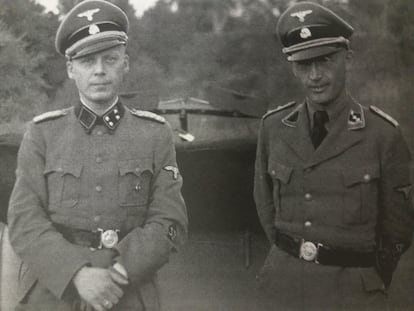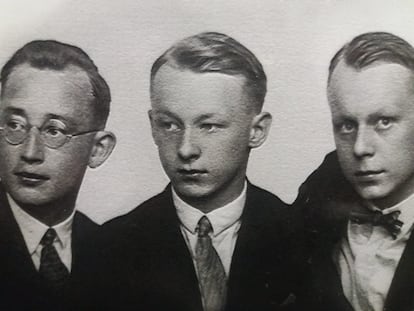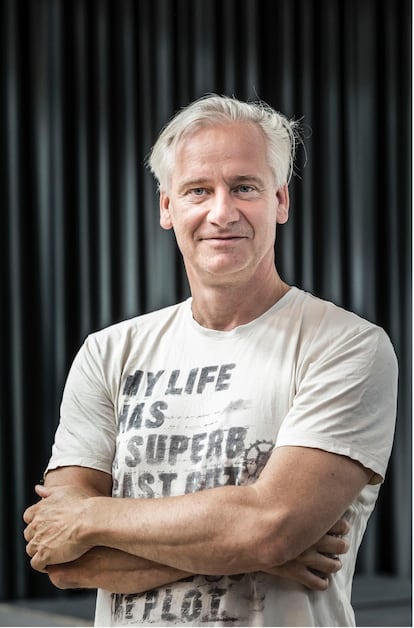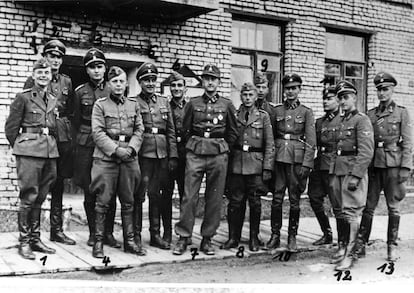The horror of discovering that your grandfather was an SS officer who personally murdered Jews during the Holocaust
In his novel ‘The Bastard Factory,’ Chris Kraus wrestles with the memory of his relative, who belonged to a roving Nazi killing squad

After a long conversation about horrors, the writer and filmmaker Chris Kraus finally breaks down. He is a lively and robust man who is accustomed to dealing with terrible things, but something inside him has broken. When he’s asked to explain his grandfather’s role in the Nazi regime and the mass murder of Jews, he turns pale and his blue eyes tear up. “My grandfather, Otto Kraus, was part of the Baltic German minority in Latvia. Reinhard Heydrich recruited him for the SD [Sicherheitsdienst], the SS agency that served as an intelligence service and was central to the Holocaust. In 1941, he participated in the invasion of the USSR as a member of Einsatzgruppen A, one of the roving execution squads that followed the troops and killed mainly Jews. He later became the head of the SD in Riga. He rose to the rank of Sturmbannführer, an SS major. He was personally involved in at least two mass executions.” In his novel The Bastard Factory, Chris Kraus recreates one of those horrific episodes. The main character is based heavily on Kraus’s grandfather, and the novel faithfully follows his journey as an SS major.
In the book, on a summer day on the outskirts of Riga, the SS and their Latvian henchmen give a group of Jews the “special treatment.” The scene closely resembles one of the massacres perpetrated in the Bikernieki (Bickern) forest, the main site of Latvia’s massacres (out of a population of 90,000 Jews, 70,000 were murdered). They are forced to undress next to a ditch and then shot in groups. Kraus writes: “Executing someone at point-blank range often means that the victims’ brain matter and blood splashes in all directions, and it did. Skull shards flew like shrapnel to where I was standing, 20 meters away. There was screaming, blood soaked the ground and the air smelled of wet iron mixed with cold sweat, excrement and urine.” The scene continues as the main character approaches to shoot a young woman and peers into the pit with his Luger in hand: “In the midst of that jumble of bodies I discerned some feet that kept shaking. It was a girl whose skull cap had been blown off and landed beside her. She was looking at me with wide eyes, still hugging her baby, who seemed intact, just asleep [...] Before I couldn’t hold back the vomit any longer, I fired my pistol at them both.”
The passage offers a glimpse into the world in which Otto Kraus (in the novel, Konstantin Koja Solm) moved, and the legacy with which his descendants grapple. “Finding out my grandfather’s story was horrible, very disturbing,” a distraught Chris Kraus explains. “I loved my grandfather.” In 1985, as a student, he became interested in the stories Otto Kraus told him. “He talked about shootings, but he never said precise words; he used terms like ‘special treatment,’ and you could think that they did something else, like going into the forest to chop wood. But then I read a book about General Vlasov [the Russian defector who commanded Nazi troops], and it contained details about my grandfather and his connection to mass murder. It was horrifying. Nobody in my family knew about it. So, I went to the archives to look for information and to find out what had happened.”
A dark legacy
He uncovered the whole truth, but none of his family members wanted to believe him, except his cousin Sigrid Kraus, a publisher. “I wrote an essay, Das Kalte Blut [or, Cold Blood], based on my research; it was published in 2014 in a small print run and meant for my family and our circle. I recounted everything to show that I wasn’t making things up and to demonstrate how incompatible everything was with my family’s memory. It didn’t help…Throughout Germany, it’s like the Nazis came down from Mars: most people say that their grandparents were excellent people, anti-Nazis, and that Hitler, Himmler and four psychopaths were to blame for everything.”
The Kraus family’s dark heritage isn’t limited to Chris’s grandfather. “[Otto’s] two brothers also belonged to the SS and were part of the killing squads, it’s an extraordinary case…madness. The elder brother, Hans, was even more involved in the atrocities, while the younger one, Lorenz, was a wartime correspondent for the SS; he was a gifted artist and drew anti-Semitic pictures.”

How does Chris Kraus bear such a heavy burden? He thinks for a long time before answering. “It’s hard to explain. I try to understand, to investigate what really happened, it’s very difficult. I try to set things right with the truth. Of all of Otto’s children and grandchildren, it has fallen to me to do it. I don’t want to be a passive accomplice, I won’t accept silence, even if the process is unpleasant for me.” Did you ever confront your grandfather with the truth? “No, never; he died in 1989, and I didn’t know his real story until 10 years later.” Would you have liked to have talked to him about it? “Yes, but he commanded so much respect... I don’t know if I would have dared, and I was the one who got along best with my grandfather. The others reproach me and say that he can no longer defend himself. To them, he was a good man, period. The truth is that he died without having to account for his crimes, like so many other SS elites, because Germany didn’t dare to bring them to justice.” Where is he buried? In Latvia? “In Nuremberg; how ironic,” Chris Kraus laughs bitterly. “Although that city came to symbolize Nazi punishment after the war, it was once very anti-Semitic and quite fond of my grandfather, and of Hitler.”
The Bastard Factory turns Otto Kraus’s life into a nearly 1,000-page novel. He participated in secret SS missions, such as the Zeppelin operation to kill Russian leader Joseph Stalin (where he met Otto Skorzeny, famous for his daring military actions, including the rescue of Benito Mussolini). Then Otto became an agent for the CIA, the Federal Republic of Germany’s new intelligence service, Org-BND, and even the KGB and the Mossad. “It’s a fictionalization of his story, based on years of research and the essay I wrote for my family.” Chris recounts the origins of the Krauses (in the novel, the Solms), their life in Latvia and the increasing involvement of Koja and his older brother Hub in the Nazi apparatus. The novel opens in 1974 in a Munich hospital. Hospitalized with a bullet wound, the main character tells his life story to the person in the next bed, an innocent, well-meaning, Buddhist, stoner hippie who can’t believe what he’s hearing.
Otto Kraus informs more than one of the novel’s characters. “Both Koja and Hub reflect aspects of my grandfather. The older one is more brutal and the younger one is seemingly more sensitive and introspective, but you like him less and less. They both have evil in them. Hub at least has a coherent stance, but Koja has that personality of agents and spies who lack core convictions and navigate a universe of falsehood and lies like a fish in water. Ambiguity is the most disturbing element in the novel.”

Given its subject, The Bastard Factory has a surprising sense of humor – Koja’s irony; the Black lover who sings Horst Wessel; the ban on playing Monopoly because it’s “a Jewish game”; the harelipped SS officer; Himmler’s car stopping to let toads cross the road; the main character’s circumcision so he can go undercover in postwar Israel as a Hebrew teacher named Himmelreich. “I’ve been harshly criticized in Germany [because of the novel’s humor]. I knew that it would happen. Actually, I think the humor makes the story even more unbearable.”
The novel also tells a love story. “The terrible thing is that Nazis like my grandfather were people. I didn’t want to depict them as demons but rather as human beings in an inhuman regime. In Germany, people prefer to see the Nazis as monsters who were nothing like the rest of the population… humor and love are incompatible with demonizing them, which is why it’s so disturbing.” Can’t it be seen as a form of justification? “No, they are stylistic devices, to help people understand that the human abysses I’m describing are not fiction. The key theme is morality, the character’s amorality. He is despicable; humor and love draw him closer to us, but they do not excuse him. We cannot distance ourselves from evil, which is part of the human condition. My grandfather was capable of loving and being loved. How could a person I knew and loved be like that in another context? I wanted to make that experience accessible to readers. It could happen to all of us.”
Kraus also portrays the world of intelligence services in which his grandfather moved following the war. The novel includes the stories of General Gehlen, Otto John, Isser Harel, the hunt for Eichmann... “It’s all true, the events during the war and after. When I discovered that my grandfather was also a spy…how do you reconcile that with the importance that my family has always attached to honesty?”

The Bastard Factory has much in common with Jonathan Littell’s great novel The Kindly Ones. The latter is also narrated by a Nazi criminal, and it describes the atrocities in detail. “I consider the comparison a compliment. It’s an extraordinary book; I loved it. We did our research at the same time: during the 15 years that I was researching information about my grandfather, we visited the same archives and consulted the same documents, I saw his name. [Littell’s] perspective is also that of the executioner. His main character, Max Aue, is a member of the SD and part of the Einsatzgruppen. But Littell worked more on the eroticism than the horror. It’s a very literary book, with…all its homoerotic and perverse fantasies. It was an inspiration, but I take a different, harsher approach.”
In Kraus’s novel, the main characters’ relationship also includes many perverse and scatological elements: Koja and Ev, his adopted sister and romantic interest, are influenced by sharing a potty as children; there’s masturbation as well. “It’s true, but I do that seeking the primitive, the elemental. There’s also excrement, and blood, and the process of turning people into corpses in acts of mass murder. My grandfather saw all that. He smelled the excrement, the blood and the fear of the people who were murdered. What did he think then? How did he handle that experience? Some of my grandfather’s comrades confessed that they enjoyed killing. Others said something that I find grotesque: they participated in the killings, yes, but in a charitable way, to avoid the unnecessary suffering of the victims.”
Tu suscripción se está usando en otro dispositivo
¿Quieres añadir otro usuario a tu suscripción?
Si continúas leyendo en este dispositivo, no se podrá leer en el otro.
FlechaTu suscripción se está usando en otro dispositivo y solo puedes acceder a EL PAÍS desde un dispositivo a la vez.
Si quieres compartir tu cuenta, cambia tu suscripción a la modalidad Premium, así podrás añadir otro usuario. Cada uno accederá con su propia cuenta de email, lo que os permitirá personalizar vuestra experiencia en EL PAÍS.
¿Tienes una suscripción de empresa? Accede aquí para contratar más cuentas.
En el caso de no saber quién está usando tu cuenta, te recomendamos cambiar tu contraseña aquí.
Si decides continuar compartiendo tu cuenta, este mensaje se mostrará en tu dispositivo y en el de la otra persona que está usando tu cuenta de forma indefinida, afectando a tu experiencia de lectura. Puedes consultar aquí los términos y condiciones de la suscripción digital.









































